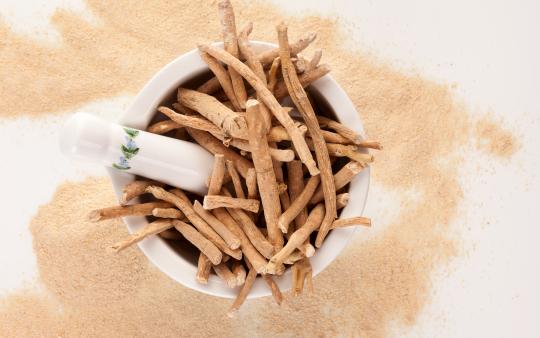Ashwagandha (Withania somnifera), a revered staple in Ayurvedic medicine, has been used for centuries in South Asia to promote longevity and healing. In Sanskrit, ashwagandha means the “smell of a horse”, which is most likely referring to the roots’ odour, but it is also believed it provides the stamina of horses; while somnifera is from Latin, meaning “sleep-inducer”, and probably refers to its use as a stress easer. This drought-resistant herb is traditionally found at higher altitudes where conditions may be less favourable for other plants, and ashwagandha’s resilience in these conditions is said to mirror its anti-stress effects on the body.
Referred to as a Rasayana, a substance that “promotes a youthful state of physical and mental health and expands happiness,”1 ashwagandha also has the distinction of belonging to a group of medicinal herbs called adaptogens, which are known for their ability to increase resilience, stabilize the stress response, and improve an individual's ability to deal with stress. Further, this herb has been found to have anti-inflammatory, antioxidant, immune-modulating, neuroprotective, and cognitive-enhancing properties.2
How Ashwagandha reduces stress
Believe it or not, stress is a normal and healthy physiological response to stressors. Stress levels fluctuate with day-to-day activities, and for the most part work harmoniously with our systems. Stress can become problematic, however, when the levels increase and become prolonged, often when the response is disproportionate to the stressor. When this happens, our bodies begin to experience symptoms like insomnia, brain fog, poor appetite, impaired digestion, increased irritability, low mood, anxiety, and decreased immune function. Although eliminating stress altogether would be ideal, the reality of our busy worlds mean that this is often unlikely. But this doesn’t mean we have to be slaves to our stressed-out state! We can take charge and improve the way our bodies respond to stress through lifestyle changes like increasing activity, consuming a balanced and varied diet, drinking water and reducing consumption of alcohol and sugary drinks, as well as supplementing deficiencies to help improve the stress response.
The Health Benefits of Ashwagandha
This is where ashwagandha may help! Research and clinical experience have shown that supplementing with ashwagandha during periods of stress can have quite effective results, possibly due to its positive influence on the hypothalamus-pituitary-adrenal (HPA) axis.3 In a 2019 study of ashwagandha’s ability to improve stress symptoms, participants were given either 300 mg starch (placebo group), 300 mg ashwagandha extract, or 600 mg ashwagandha extract for a period of 8 weeks.4 Perceived stress, serum cortisol, anxiety, and sleep quality were all significantly improved in the ashwagandha groups, with greater improvements seen in the 600 mg cohort.
When we are stressed-out, our hormones and nervous systems get out of whack and ashwagandha’s adaptogenic properties may help bring them back into balance, which may also help with sleep—something our bodies desperately need that is typically in short supply when we’re stressed. A systemic review of five human trials of ashwagandha versus placebo concluded that the herb has considerable anxiety-reducing effects.5 Another 10-week study found that participants who were prescribed 600 mg of ashwagandha root extract noted improvement with sleep onset latency, total sleep time, sleep efficiency, mental alertness upon rising, and overall sleep quality.6
Is Ashwagandha safe?
Ashwagandha is generally safe to consume on a long-term basis, and has been found to exhibit little to no toxicity.7 It is best to take for a minimum of eight weeks for best results. Dosing typically ranges from 300–600 mg capsules, with therapeutic dosing usually in the higher range. Timing of dosing may be important as well, depending on your target; for example, when your cortisol levels are the highest during the day (for stress) or before bed (for sleep).
Caution: Ashwagandha is not considered safe for pregnant women or children.
For references visit ecoparent.ca/TWF/Fall20.
You may also enjoy: Ashwagandha: Essential in Your Parental Toolbox for Managing Stress, Holistic Remedies for Anxiety and Stress Relief, and 6 Adaptogens that Help with Stress, Immunity, and Much More.









